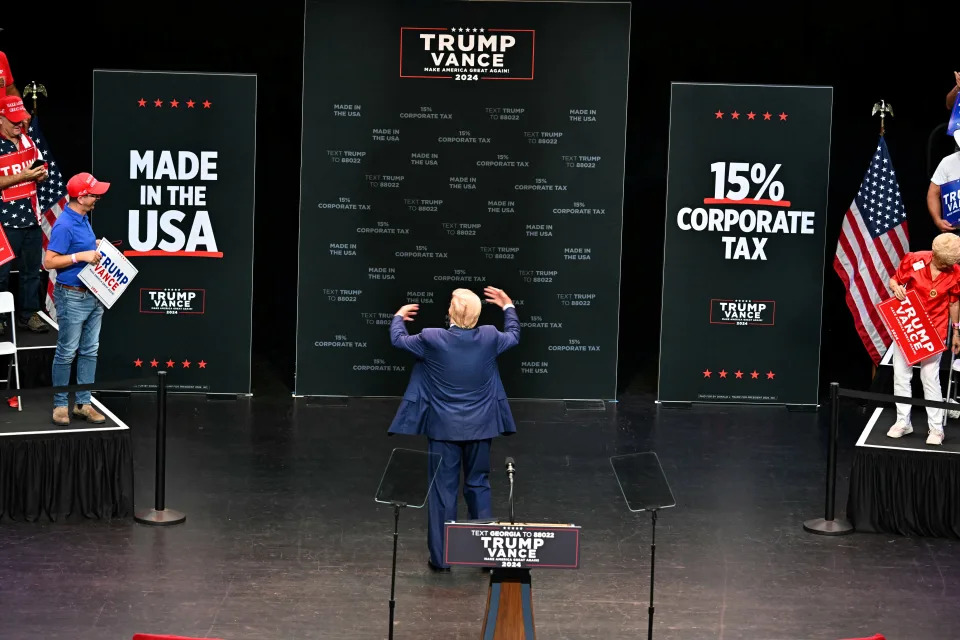News
The House may soon belong to the GOP. Here's what party leaders say they'll do first.
The House of Representatives is highly likely to be under GOP rule next year, cementing Republicans' unified control of power across Washington.
The party currently needs just four seats to maintain its lower chamber majority, and current vote totals show Republicans ahead in eight of the 18 still undecided contests, according to the latest Associated Press tabulations .
With the drama slowly fading away, party leaders have turned to openly planning their agenda in recent days in expectation of what some observers have termed a GOP trifecta — alongside already established party control of the Senate and White House — or, more bluntly, a "full Trump" scenario.
"The American people have spoken and given us a mandate," House Speaker Mike Johnson recently posted . "We will be prepared to deliver on day one."
But it will also be an exceedingly narrow House majority when the final tallies are in, likely less than five seats in the 435-seat chamber even as leaders lay out plans to push through an aggressive second Trump economic agenda quickly.

And the stakes are high.
"Next year is really an inflection point on fiscal policy," Bipartisan Policy Center executive director of economic policy Shai Akabas said in a recent Yahoo Finance appearance.
It could be an opportunity to begin to correct the US government's fiscal imbalance, Akabas added, "but there's also a chance that things go south and we keep digging the hole deeper."
House Speaker Johnson is seen as the frontrunner to keep his position atop the House GOP caucus after President-elect Trump said Johnson is doing a "terrific job" when he spoke last week as the votes were coming in.
"We will operate from our well-designed playbook, and execute those plays with precision," Johnson himself wrote to his colleagues this week.
Here is a closer look at what Johnson and his colleagues hope to accomplish in the months ahead:
A first-100-day agenda focused on taxes
"Our Republican conference has spent the last two years preparing for this moment," House Majority Leader Steve Scalise wrote in his own post-election letter to colleagues.
And indeed they have, with House leadership and members meeting as early as last summer to begin organizing a massive tax bill — and making a plan to get it over the finish line in perhaps the first 100 days of Trump's second term.
It will still be a heavy lift to move that quickly.
There are unresolved debates within the GOP on how to approach key provisions, not to mention a complex and arcane reconciliation process. It is a process filled with procedural traps that Democrats could exploit but is needed to allow the Senate to pass the bill without Democratic votes.

"President Trump wants to be aggressive," Johnson added in a recent Fox News interview. "He wants to go big, and we're excited about that."
Johnson has also signaled in recent communications that the quick action on taxes will be sold to the American people as a way to tackle the high cost of living and ease the effects of inflation in recent years, even as some economists worry the cuts could provide moderate upward pressure on prices via a demand-increasing stimulus to the economy.
A keen area of interest will also be around the current 21% federal corporate tax rate. Trump ran on an agenda of slashing that to 15% even after suggesting in private earlier this year that a cut of that magnitude might be too much.
Whether he can now convince his party remains to be seen. As far back as last summer, some members of the populist wing of the GOP signaled a willingness to leave the tax rate at 21% or even accept an increase to help pay for other priorities.
One member of this group who has expressed skepticism on this issue in the past is Rep. Chip Roy of Texas, He recently posted a closing campaign message saying his efforts in the coming years would be focused on "sanity on spending" and taking on on both "big government and crony corporations."
"I don't kiss anybody's ring, Democrat or Republican," he added.
Another round of debates also awaits on the nearly dozen other tax promises that Trump made on the campaign trail and is likely to want included in the final bill.
But those ideas have opponents even within his own party, and they could drive the price tag even higher, perhaps into the neighborhood of $9 trillion over the coming decade.
A focus on energy — and a possible debt ceiling resolution
Republicans are also signaling a keen focus on energy that will be closely watched in both the traditional fossil fuel and green energy sectors.
The formal plan outlined by leader Scalise indicates a focus first on fossil fuels, including potential legislation to mandate oil lease sales and open up new federal lands to drilling.
Energy provisions in the Inflation Reduction Act — the sprawling 2022 law signed by President Joe Biden — will also be on Republican to-do lists.
Trump has promised to repeal green energy credits included in that law. And in a recent Wall Street Journal interview , billionaire financier John Paulson, a possible Trump Treasury secretary, said that his particular focus if he is installed would be on eliminating green energy subsidies.
House leaders have not yet outlined their full plan of action there, but they have long made their distaste for the law known.
Another closely watched fiscal issue that would be closer to resolution under unified GOP control is the debt ceiling.
The question of US creditworthiness is set to again be up for debate beginning on Jan. 2 when, per a deal inked between President Joe Biden and then-House Speaker Kevin McCarthy, the debt ceiling will be reimplemented.
But if Republicans are in full control, lawmakers are unlikely to drag out talks to raise the limit further there.
Historically, the debt ceiling has been a contentious issue when the time for raising comes because Washington was split.
Though the format of how they raise the debt ceiling remains to be seen, Republicans are unlikely to flirt with what would be a self-inflicted political wound in 2025 before an actual default becomes a possibility next spring or summer.
Ben Werschkul is Washington correspondent for Yahoo Finance.
Every Friday, Yahoo Finance's Rachelle Akuffo , Rick Newman , and Ben Werschkul bring you a unique look at how US policy and government affect your bottom line on Capitol Gains. Watch or listen to Capitol Gains on Apple Podcasts , Spotify , or wherever you find your favorite podcasts.


